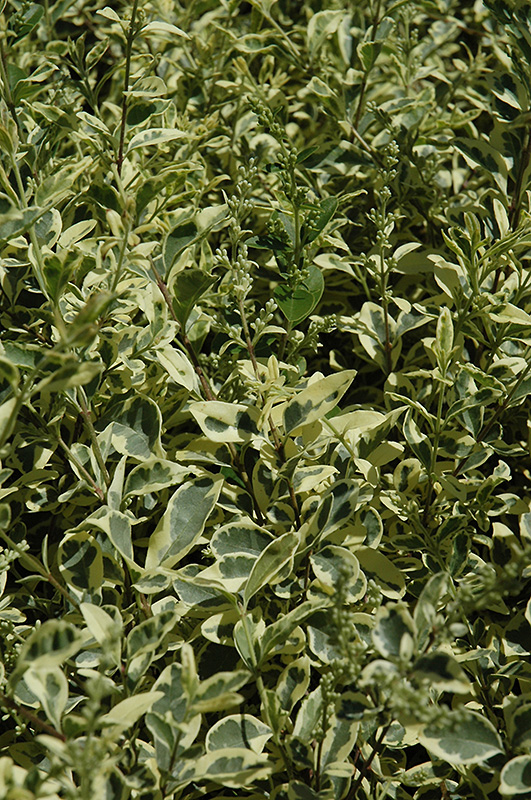Plant Search & Info
Variegated Japanese Privet Ligustrum japonicum 'Variegatum' Height: 10 feet Spread: 6 feet
Sunlight:
Hardiness Zone: 6b Other Names: Waxleaf Privet Description: An attractive, versatile shrub with waxy, pointed glossy green leaves with white edges and blotches; the shrub has an open shape as it ages, it is quite beautiful and can be limbed up and used for bonsai; delightful panicles of white flowers Ornamental Features Variegated Japanese Privet features showy panicles of white flowers at the ends of the branches in mid spring. It has white-variegated dark green foliage. The glossy pointy leaves remain dark green throughout the winter. Landscape Attributes Variegated Japanese Privet is a multi-stemmed evergreen shrub with an upright spreading habit of growth. Its average texture blends into the landscape, but can be balanced by one or two finer or coarser trees or shrubs for an effective composition. This is a relatively low maintenance shrub, and is best pruned in late winter once the threat of extreme cold has passed. It has no significant negative characteristics. Variegated Japanese Privet is recommended for the following landscape applications; Planting & Growing Variegated Japanese Privet will grow to be about 10 feet tall at maturity, with a spread of 6 feet. It has a low canopy with a typical clearance of 1 foot from the ground, and is suitable for planting under power lines. It grows at a fast rate, and under ideal conditions can be expected to live for approximately 30 years. This shrub does best in full sun to partial shade. It is very adaptable to both dry and moist growing conditions, but will not tolerate any standing water. It is considered to be drought-tolerant, and thus makes an ideal choice for xeriscaping or the moisture-conserving landscape. It is not particular as to soil type or pH, and is able to handle environmental salt. It is somewhat tolerant of urban pollution. This is a selected variety of a species not originally from North America. Variegated Japanese Privet makes a fine choice for the outdoor landscape, but it is also well-suited for use in outdoor pots and containers. Its large size and upright habit of growth lend it for use as a solitary accent, or in a composition surrounded by smaller plants around the base and those that spill over the edges. It is even sizeable enough that it can be grown alone in a suitable container. Note that when grown in a container, it may not perform exactly as indicated on the tag - this is to be expected. Also note that when growing plants in outdoor containers and baskets, they may require more frequent waterings than they would in the yard or garden.![]()
![]()
![]()
![]()
![]()
![]()
![]()
![]()
![]()
![]()
![]()
![]()
![]()


